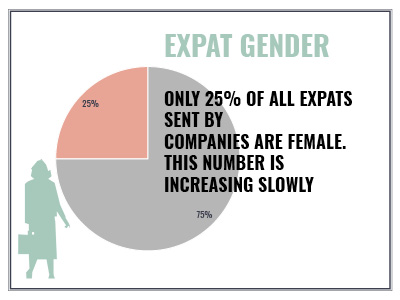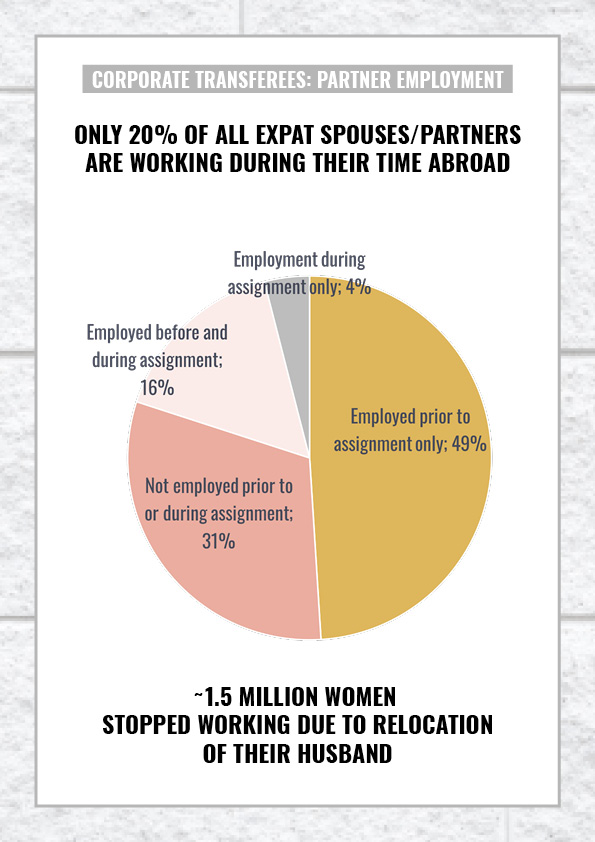
The Expatriation: A journey into the past for modern women?
Since I started my adventure of living abroad and even more after diving into the business behind expatriation, I am fascinated by the shift of gender roles in expatriation. In this blog post, I want to elaborate a bit about my personal experience with the gender inequalities and add some interesting resources I found.
Starting expatriation: Boarding a plane to housewife country?
Before my husband and I moved abroad we lived a very equal relationship. Equal in the sense that we split all bills in half and have both been working towards our career. Back then, paying my bills was really important to me. When a friend of mine got pregnant, stopped working and relied on the money of her husband I began wondering whether I could ever be ok with that for myself. I still see myself as a self-sufficient independent woman but our expat experience has changed my mindset. Today I am more understanding for my friend and even found myself in the role of not contributing equally to the bill any longer. It took me a while to be ok with that -and it is still an ongoing journey!
A journey into the past
When you start your expatriation, you might suddenly find yourself on a journey to the past. It’s a throwback to a time where gender and relationship roles are still very traditional and everyone is expressing their opinion accordingly. Overnight your surrounding changes and everyone seems to have a clear vision on your new role, which comes with obligations and expectations.

Three simple examples to illustrate:
The importance of marriage
Most companies only acknowledge you as an Expat Partner (and therefore eligible for financial support) when you are married. This starts with the work permit and ends with the compensation an Expat gets when moving his family abroad. The acknowledgment of a partnership during expatriation is even more difficult for same-sex couples. While work permits are based on the country’s regulation, the financial compensation depends on the company’s culture. Hence it can be a mirror of how modern or traditional a company define relationships. In most cases, a marriage is the requirement for being a legitimated partner in the eyes if the company.
Want some good vibes in your inbox? Travel Guides? Coaching Exercises?
QUESTIONING OF THE NEED TO WORK
Within the first months of our time in the US, I was focused on continuing in my former career path as a marketing and business consultant. I was expanding my network and was applying for relevant jobs. I talked to the German Chamber of Commerce and several other official agencies. At the end of the day, you won’t believe how many times I have heard: „Why do you want to work? Your partner is earning enough to make a living for you two. Better be there for him, support him emotionally and just enjoy life.“ Not exactly what you want to hear when you are eager to work, learn, and grow professionally. It can be really discouraging to hear that – even more so when you think about one of the most obvious questions of employers when you moved back: „Why did you not work during expatriation?“.
THE FEAR OF BEING PERCEIVED AS THE SPOILED EXPAT PARTNERS
At the same time, you are faced with comments from friends and family back home: „What are you doing all day? Don’t you get bored? Oh, I can imagine you chilling at the pool, going to the nail salon and enjoy life. Lucky you!“ If work/professional development/having a career is an important aspect in your life you might find those comments demotivating and devaluing. The term „trailing spouse“ itself indicates that the partner does nothing else than following someone else. However, work is not only a way to earn money but to be fulfilled, recognized by society and having the feeling of being of value.
Why are most Expat Partner women?
Still, up today, 75% of employees send on an international assignment are men. Corporations are trying to increase the number of female Expats. They do so by pushing young female professionals into roles with higher responsibility and (even more important) visibility. However, it seems that her being recognized by the company and nominated for an assignment is not the only bottleneck. An even more interesting bottleneck can be found within the relationships. Often the partner hesitates to pause his career and take on the challenge of becoming the Expat Spouse. We might become all very open-minded about emancipation, equal pay or women focusing on their career AND having kids. However, when women start to become the main breadwinner, there is still a tendency to shy away from it.
Female Expats have lower return rates
I am hoping for more female Expats in the future. I see this as an indicator of a leveled playing field in the professional world. Interestingly enough, researchers found out that expat couples do best when transferred for the women’s job. I love the research by the expat expert Dr. Yvonne McNulty and I referred to her work several times throughout my Career Workbook for Expat Partners.
The research behind
Family concerns are still the number one reason for failed international assignments. McNulty argues that she very seldom comes across women who returned early from an assignment. In her opinion, one reason is the profound preparation women tend to do before accepting a job. Women are more likely to evaluate a job offer not only regarding their own career value but they also think about their partner and the consequences for him.
“I can count on my hand maybe one or two failures by women expatriates over the past 15 years in all the research I’ve done. Women expatriates almost without exception handle relocations differently—and I would argue more successfully—than men.” says Dr. McNulty.


“If the husband is not 100% onboard, they turn the [relocation] down. No guilt trips, no nonsense. Women are smart that way.”
The effect of expatriation on the relationship
As stated, the popular term “trailing spouse” usually refers to the non-income producing spouse. However, in modern days, dual-income couples tend to be the new norm. Hence, becoming a trailing spouse often comes with a forced stop of career plans. Statistically, only 20% of Expat Partners are working abroad. The reasons behind are manifold. It’s often connected to work permits, cultural circumstances or simply due to difficulties entering a foreign job market. As a consequence, dual-career-couples start to turn into a one-income-household not out of choice but due to the circumstances.
How a relationship can change
From my research and various interviews with fellow Expat Partners, this has a tremendous effect on the dynamics of a relationship. Suddenly financial dependency comes on the table often mixed with unverbalized accusations against the partner who moved the family abroad. Divorces or separations during an assignment are risks not to be ignored. If you are reading this and find yourself in a similar situation I can’t recommend enough to communicate! Open communication is key! The longer you are not expressing your own vision for life/career or addressing doubts you are having, the harder it will get. Make your partner aware of your struggle. He most likely will have no idea or is underestimating the situation. One of the best feedback I got to my Career Workbook for Expat Partners has been that she will give it to her husband to read so he finally understands the full picture and what she is going through.
“I see women engaging in healthy decision making when it’s their career for the relocation. I don’t see the same among men. By engaging in subsequent relocations (back to back) or by relocating when their wives are having babies and already out of the workforce, they deal their wives out of the relocation decision making because the wife no longer has a financial card to play.”
"I wanted to tell you how much I loved your workbook. I find it is an amazing tool for expats that are beginning their journey or someone like me that will be moving for the third time! I wish that I had that tool the first time that we moved because it was hard for my husband to understand what I was going through. So this time around I made the choice that he reads it too!!" Marlaine Legault
Remember: Only when the other person is aware of your emotions and the reasons behind, he or she can act on it. This is something that is also very relevant in coaching. There are different levels on how we communicate. Uncover the unspoken is most of the time the key to progress.
Make an agreement from the very beginning
To share from my very own personal experience: I and my husband agreed on an early-return possibility from the very beginning. He expressed right away that we will pack our bags immediately if I am not seeing any future in this adventure. We are enjoying our time abroad very much and I am thankful for everything I have learned along the way. Most of all for the possibility to start my own business. However, I was only able to unfold myself because I know that he takes my own needs seriously and is aware of the impact on my life.
According to Dr. McNulty, 99% of trailing spouses say that „a strong and stable marriage“ is the number one factor contributing to assignment success. I can totally agree with that! Expatriation can often be an indicator for the health of your relationship. As gender roles are easily affected by expatriation prepare yourself for a potential shift and know your own boundaries. A shift of gender roles is paying into this struggle of expat relationships.
So to sum up, expatriation comes with lots of barriers for emancipation and we as women need to step up for our needs and make clear what is on the stake. I am hoping to create more awareness and discussion with my work to help Expat Partners strive for their passion. Let’s say goodbye to the burdened term „trailing spouse“! I for myself will keep on educating people about this imbalance. It is my experience, awareness is the first step to change!
It is also worthwhile to discuss the challenges of males Expat Partners and I am currently digging deeper into this topic with some interviews. If you know someone who would be willing to share his story let me know.
Would love to hear your thoughts and stories! If you are up to let’s share in the comments below or send me a message to info@sharethelove.blog.












